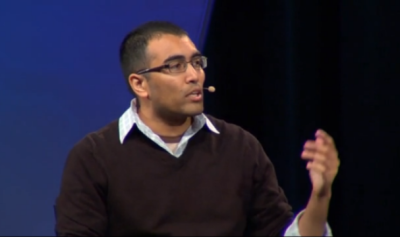Hemant Mehta the 'Friendly Atheist' Shares His View of Christians With Oak Hills Church Congregation

The Rev. Randy Frazee, senior minister at Oak Hills Church in San Antonio, Texas, knew he was making a controversial decision when he invited atheist Hemant Mehta to speak to the 8,000-member congregation and share his perspective on Christians and their attitudes toward atheists. But he also believed that, in the end, it would benefit church leaders, the congregation, and even Mehta in the process.
Mehta, a Chicago public high school math teacher who writes the "Friendly Atheist" blog on Patheos, first met Frazee in 2006-2007 after he "sold his soul" on eBay and received a winning bid of $504 from a former pastor who asked Mehta to visit 10 Chicago-area churches and write about his experiences on the pastor's ministry website.
Among the churches Mehta was assigned to attend was Willow Creek Community Church in South Barrington, Ill., where he watched Frazee, then a teaching pastor at the church, preach a Wednesday night sermon.
Although Mehta wasn't moved to accept Jesus Christ as his Lord and savior that night, or anytime thereafter, he did build a lasting friendship with Frazee, who believed the OHC campuses could learn from hearing an outsider's perspective on what Christians are getting right, and what they're getting wrong, especially when trying to convert nonbelievers.
Mehta, who spoke to all four Texas campuses – services that were also attended by 10 atheists – was raised in the Jain religion. As a young teenager he had discovered that he wasn't able to share his doubts about his faith with his parents or leaders at the temple, and subsequently became an atheist.
He also shared with the congregation that even though many of his atheist friends, some of whom are former Christians, spoke negatively about Christianity, he wanted to learn more about the faith for himself, and to experience it on his own, before rejecting it.
During his conversation with Frazee, Mehta spoke about a few of the scenarios from his 2007 book, I Sold My Soul on eBay and mentioned that although he faults Christians for stereotyping and mischaracterizing atheists – just as atheists do with Christians – one of the things he admires most about Christian churches are the charitable efforts being made in the community.
"Christians do an amazing job of charity," Mehta commented. "They have a habit of giving, and the church has provided a way to give to good causes. Being part of this community – praying for people, making people dinner when they're sick, providing financial assistance to people who've lost their job. That total strangers could care for other people like that, and there was this embracing community in a lot of places, that's awesome to see."
He continued, "It's very hard to go to atheists and say, 'religion is bad and Christianity is evil,' when that's what I'm seeing."
That being said, Mehta was also highly critical of pastors who cite stories that he says aren't true as a way to support their sermons. He also said that Christians need to do a better job of welcoming visitors into the church, and to not just leave the friendly greeting to the church greeters who stand outside the sanctuary.
"Treat a person as a human being, and reach out and get to know them," he said.
And when reaching out to an atheist, Mehta emphasized to not treat them like a project, or as if they're people who are broken and need to be fixed. He explained that just because a person is an atheist, it "doesn't mean they are immoral, untrustworthy or are not a good person," or even that they have bad familial relationships.
Frazee, who reiterated Mehta's comments about witnessing Christian charity when speaking to the OHC congregation, told The Christian Post in a statement that if Christians are going to reach people, open communication is paramount, for not only reaching out to atheists, but also with being able to talk to believers about their doubts about faith.
"Studies are showing we are losing our children," Frazee noted. "We need to provide a safe place for children and people to ask questions in their families and in the church.
Frazee said that although interviewing Mehta at the church was a risk, and he knew not everyone was going to be in agreement with that decision, he was pleased to also receive positive feedback from OHC members, especially those whose children are questioning their faith, or who might even be leaning toward atheism.
One such parent wrote a letter to the pastor about her and her husband's unconditional love for their son who has doubts about Christianity. They told the pastor their son's ability to share his doubt with them has made them stronger. "Ironically, my son's season of unbelief has strengthened the faith of both my husband and I. We pray more fervently, more regularly and we now pray together. God has also been showing us how to love our son unconditionally," the parent wrote in the letter thanking Frazee for inviting Mehta to speak at the church.
"We knew we were going to get push-back, and we're OK with that," Frazee said. "The goal is for people to love their neighbors and by removing stereotypes and sharing stories it allows for communication and relationships. We are called to love our neighbor and God's job is to convert them."
In Frazee's opinion, he believes the experience showed Mehta that "most people aren't won over to Christ by intellectual argument, but by personal experience, even though Christianity is intellectually based."
He also told CP that the experience has shown church leaders that they need to get out of their comfort zone.
"We can and should have conversations with people who don't agree with us. We shouldn't ignore them. Adults and children need to have a safe place to process their doubts at home and in church."





























